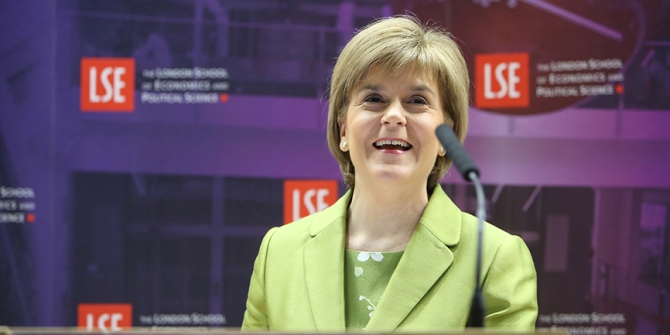 Should the alcohol industry, or other industries, have a role in policymaking? This question arises when industry misrepresents research showing the health benefits of interventions. Will Haydock points out that evidence of public health gains can’t show whether this is a desirable aim overall, since perhaps liberty and the pleasures of intoxication and taste trump living longer. Policy cannot be solely informed by evidence, because evidence without aims is meaningless. So whilst industry perhaps shouldn’t be engaged in interpreting research evidence, they should certainly be able to have a role in defining the problem.
Should the alcohol industry, or other industries, have a role in policymaking? This question arises when industry misrepresents research showing the health benefits of interventions. Will Haydock points out that evidence of public health gains can’t show whether this is a desirable aim overall, since perhaps liberty and the pleasures of intoxication and taste trump living longer. Policy cannot be solely informed by evidence, because evidence without aims is meaningless. So whilst industry perhaps shouldn’t be engaged in interpreting research evidence, they should certainly be able to have a role in defining the problem.
Alcohol policy seems to be rarely out of the headlines, but there’s been a particular focus on it recently, with the government having ‘shelved‘ minimum unit pricing (MUP), sparking some organisations to walk away from the responsibility deal, given that the government had clearly promised to implement this policy in its Alcohol Strategy just over a year ago. This, along with the debate around Lynton Crosby’s role in the decision to also shelve standardised packaging for cigarettes, has led to renewed questions around the role of the ‘industry’ in policymaking.
This issue was a big story in the media a few months ago, as a result of a report by Jim McCambridge, Ben Hawkins and Chris Holden which argued that the alcohol industry misrepresented research evidence in its submissions to the Scottish government’s 2008 alcohol policy consultation. The specific suggestion of the researchers was that ‘industry actors’ shouldn’t be involved in ‘the interpretation of research evidence’. A lively debate followed (I found John Holmes on Twitter particularly interesting), and in one case strayed into a semantic discussion of the nature of ‘evidence’. The headline of a blog on the Guardian website presented the wider debate in stark terms: “Should those with a vested interest comment on minimum alcohol pricing?” The headline seemed to be itself a misrepresentation of the clear summary of the research that followed, by Suzi Gage.
It seems to me almost self-evident that the alcohol industry should be permitted to express its views on government policy, rendering the Guardian blog headline a bit of a straw man. What’s at issue is quite how this should happen.
There is a statement in the article by McCambridge and colleagues that ‘policy making is not a purely rational process, informed only by evidence. It is by definition political and thus subject to a wide range of influences’. I see this as a false dichotomy between rationality and politics. Policy cannot be solely informed by evidence, because evidence without aims is meaningless. The decision on what these aims might be is certainly political, but that does not mean that it is by definition ‘not … purely rational’ – or more precisely that this somehow contrasts categorically with discussions of evidence.
The specific wording by McCambridge and colleagues about industry involvement in ‘the interpretation of research evidence’ really amounts to a claim that the alcohol industry isn’t the expert in thinking about ‘what works’ – and importantly, before we start to think about ‘what works’, we need to know what we’re trying to do. This implications of this point really hit home with me last November, when I was attending the DrugScope conference and felt that, regardless of my personal position, I could probably make the industry’s case better than Mark Baird was doing. This is partly about not being so confrontational with those coming from a public health perspective, but it’s also about shifting the debate to ground where there is genuine uncertainty.
The industry has a perfect right to sit at the policymaking table, but it’s only a genuine stakeholder if it is being the industry. If it’s trying to be a commentator on research evidence, you’re probably better off asking someone else (like McCambridge, or any number of other people). The industry might commission research – but then you’d want to ask the actual researchers about the detail of that, rather than an industry representative such as Mark Baird (particularly given his slightly unusual definition of what constitutes ‘evidence’).
The key point is that the discussion of industry ‘misrepresentation’ of research evidence can’t be a genuine debate about efficacy or effectiveness. Evidence can’t really change the industry’s position on intervention, because it’s based on prior views on economics and politics. This applies not just to the alcohol industry’s position, but to alcohol policy in general. Public health evidence can show that an intervention like MUP might reduce health harms across a population, or perhaps for a specific group; what it can’t show is whether this is a desirable aim, or (assuming health understood in these terms is a ‘good’ we want to promote as a society) how this balances against other potential ‘goods’ such as the pleasure of intoxication or the principles of liberty and autonomy.
In a sense the industry should just come out and make this position clear, for reasons of transparency and so that we can have a constructive dialogue and genuine debate. I’m even tempted to think that as well as this, being open in this way would actually improve the industry’s standing – in policymaking or public health circles at least.
Personally, I’m not sure that MUP would actually be, for example, an infringement of individuals’ (or corporations’) rights, but these sorts of arguments can’t be entirely undermined by predicted public health benefits. When McCambridge says (in the radio link on the BBC article) that MUP would ‘benefit’ society at the expense of the industry, he’s assuming a particular view of the ‘good life’ and a particular conception of ‘society’ as opposed to ‘industry’. These assumptions are not incontrovertible truths; they are particular ways of understanding the world.
If, in the mind of the public (or policymakers specifically), liberty and the pleasures of intoxication and taste trump living longer, that’s it – the argument is over no matter how effective a potential intervention might be. And this would be without questioning the reliability or validity of the public health evidence. In a sense, this is the stated position of McCambridge and colleagues – as I quoted above, what they actually say is that ‘industry actors’ shouldn’t be involved in ‘the interpretation of research evidence’. This could simply mean that the industry wouldn’t have much of a role in the later stage of policymaking (discussing ‘what works’), but it might feed into a prior one: defining the problem.
However, I’m not sure how this could work out in practice. I can’t really see the industry changing tack and being more open about their interests and objections. (This is at a time when unfavourable comparisons with the tobacco industry are being made by McCambridge and colleagues.) On the other hand, this doesn’t matter so much if we have policymakers and a wider public who are able to see the issues for what they are and consider them critically. My blog, where I originally posted a version of this article, is called Thinking to Some Purpose after the book by L Susan Stebbing. At the heart of her book is the idea of a public more willing and able to engage critically with public policy issues and cut through political rhetoric, alongside the hope that politicians and other policymakers themselves might be clearer in their thought and speech. Given that today, almost 75 years after it was first published, the book’s arguments still seem directly relevant, it’s easy to be defeatist about the nature of public debate. For the moment, though, I’m happy just to keep trying to follow Stebbing’s advice that ‘we should develop in ourselves a habit of sceptical inquiry’. I hope this post can be seen as fitting with that aspiration.
A version of this article was originally published on William Haydock’s blog, Thinking to Some Purpose.
Note: This article gives the views of the author, and not the position of the British Politics and Policy blog, nor of the London School of Economics. Please read our comments policy before posting.
Will Haydock is the Information and Research Officer for the Dorset Drug and Alcohol Action Team and also works part-time at Bournemouth University on a whole range of projects within the School of Health and Social Care. He completed a PhD at Bournemouth University looking at ‘binge’ drinking in Bournemouth and exploring how class and gender are part of how people understand their own and other people’s drinking. He is on Twitter: @WilliamHaydock





